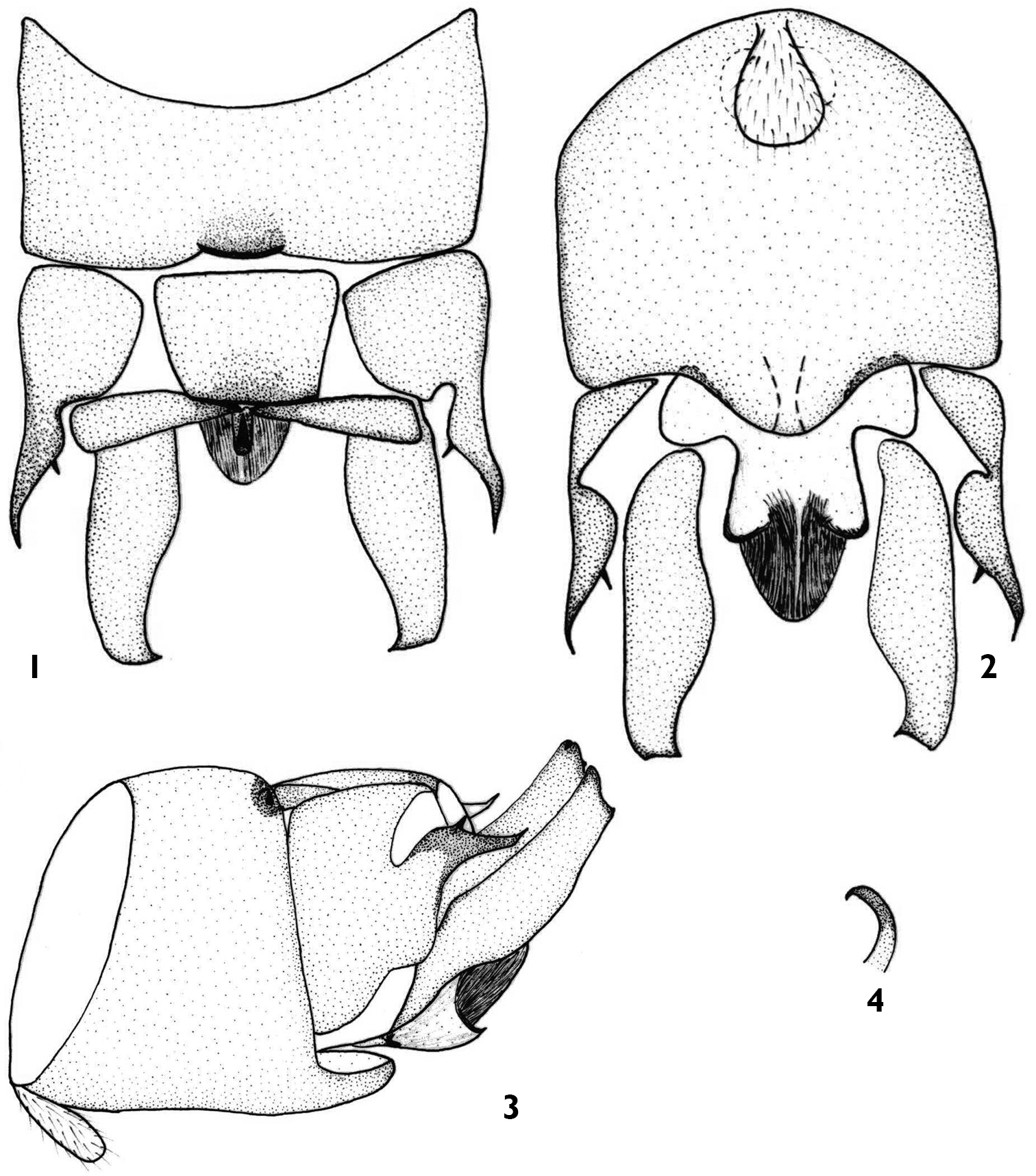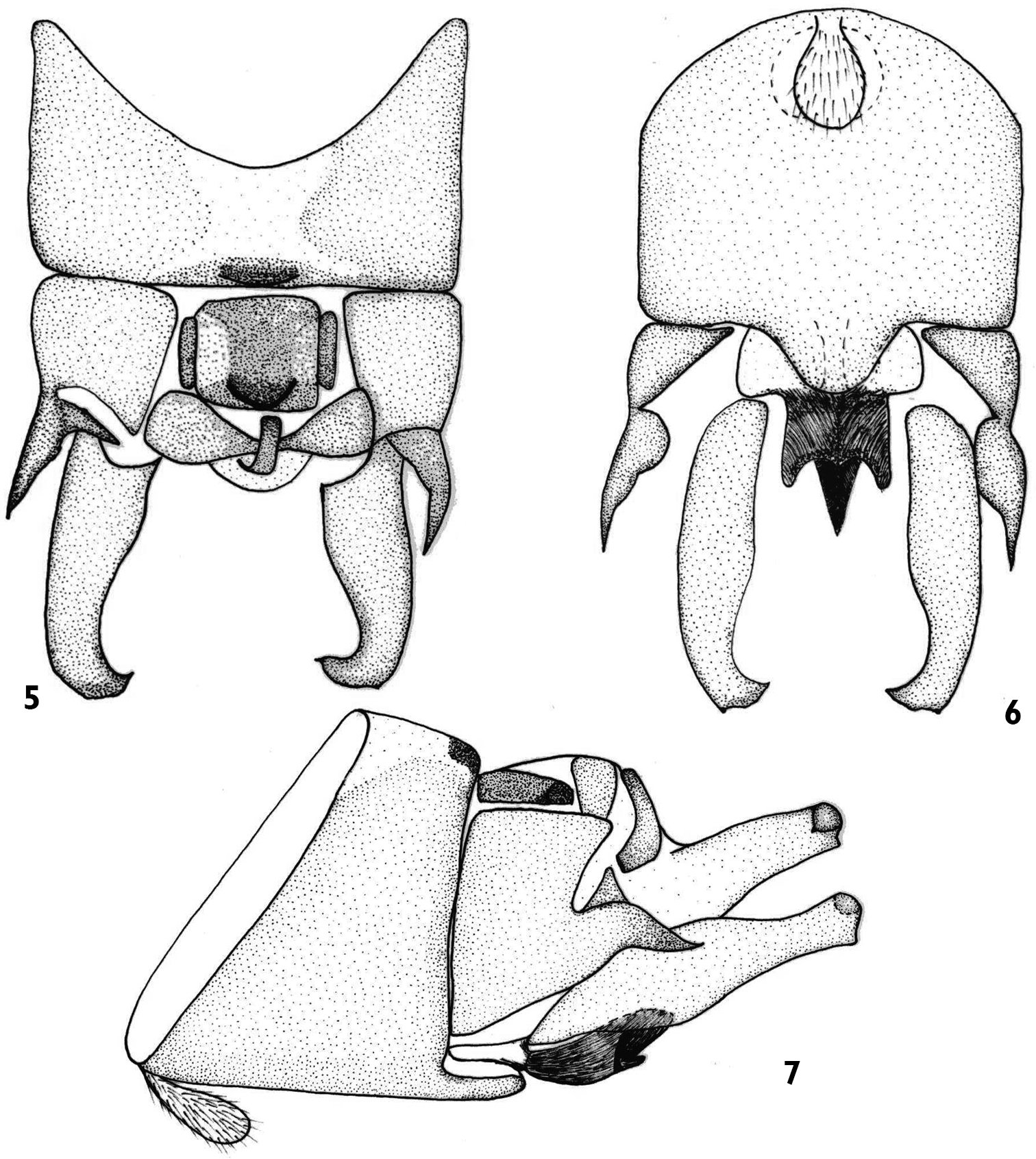






(C) 2011 Qian Yu-Han. This is an open access article distributed under the terms of the Creative Commons Attribution License, which permits unrestricted use, distribution, and reproduction in any medium, provided the original author and source are credited.
For reference, use of the paginated PDF or printed version of this article is recommended.
Two new species of Rhopalopsole Klapálek from China are described: Rhopalopsole exiguspina Du & Qian, sp. n. and Rhopalopsole ampulla Du & Qian, sp. n., which were collected in Guizhou province, China.
Rhopalopsole, Leuctridae, Plecoptera, new species, China
The genus Rhopalopsole belongs to the family Leuctridae and is distributed throughout the Oriental and Palaearctic Regions. The abdominal segments of Rhopalopsole species are unmodified, but the last segment bears on both lateral sides a chitinous process, the shape of which is an important character for distinguishing species. Cerci are one-segmented and slightly modified in males, and cerci shape varies according to species (
Here we describe two new Rhopalopsole species collected in Guizhou province, China. All type specimens were preserved in 75% ethanol and deposited in the Insect Collection of Yangzhou University, Jiangsu, China.
Taxonomyurn:lsid:zoobank.org:act:B26AB2A6-972F-4A18-9D1D-486A980CF80F
http://species-id.net/wiki/Rhopalopsole_exiguspina
Figs 1–4Holotype ♂ from China, Guizhou, Yanhe County, Shaba Village, 903m, 5 Oct. 2007, Leg. Xue Hai-Yang. Paratypes 18♂♂, the same details as holotype.
General color: Light brown. Head brown or light brown, wider than prothorax, hind ocelli much closer to the eyes than to each other, antennae and palpi yellowish brown. Prothorax light brown, subquadrate, all angles somewhat rounded and some black irregular stripes on it. Legs light brown. Wings hyaline and veins light brown.
Approximate measurement: forewing length 6.0 mm, body length 6.5 mm. Mid-posterior margins of tergite 9 sclerotized, slightly emarginated (Fig. 1). Sternite 9 basally with a tongue-like vesicle bears dense hairs, apically with a subgenital plate wider than long and rounded apically (Fig. 2). Tergite 10 with strongly sclerotized lateral process beak-like somewhat acute and curving inward apically and a small spine at the middle of lateral process in dorsal view, thick basally and slightly curved upward apically in lateral view. Mid-anterior sclerite sclerotized, posterior margin more sclerotized; one pair of transverse triangle sclerite weakly sclerotized (Fig. 1). Epiproct a simple curved process, erect hook-like apical portion curved inward (Fig. 4). Subanal lobe sinuate in lateral aspect, rounded and strongly sclerotized apically, apex membranous in ventral aspect; subanal lobe clearly with a pair of little lobes at middle of subanal lobe and each little lobes rounded apically in ventral aspect. Cerci long and cylindrical, thick basally and thin apically, distinctly upturned in lateral aspect, apex with a tiny spine.
Unknown.
The species name refers to the small spine at the middle of lateral process of tergite 10.
This new species resembles Rhopalopsole aculeata
Rhopalopsole exiguspina male structures 1 Male terminal, dorsal aspect 2 Male terminal, ventral aspect 3 Male terminal, lateral aspect 4 Epiproct, lateral aspect.
urn:lsid:zoobank.org:act:B6B94919-A1E4-48D2-9CE6-6AA7A1DF63C9
http://species-id.net/wiki/Rhopalopsole_ampulla
Figs 5–7Holotype ♂ from China, Guizhou, Yanhe County, Shaba Village, 903m, 5 Oct. 2007, Leg. Xue Hai-Yang. Paratypes 6♂♂, the same details as holotype.
General color: Brown and dark brown. Head brown or dark brown, wider than prothorax, hind ocelli much closer to the eyes than to each other, antennae and palpi brown. Prothorax dark brown, quadrate, longer than wide, all angles rounded and some black irregular stripes on it. Legs light brown. Wings hyaline and veins light brown.
Approximate measurement: forewing length 8 mm, body length 8.5 mm. Tergite 9 sclerotized, with a large central membranous area, the mid-posterior margin strongly sclerotized (Fig. 5). Sternite 9 with a subgenital plate wider than long and rounded apically, basally with a tongue-like vesicle bears dense hairs (Fig. 6). Tergite 10 with two small narrow lateral mid-anterior sclerites and one large broad median mid-anterior sclerite; mid-posterior more sclerotized and protrusive; one pair of transverse sclerite weakly sclerotized (Fig. 5). Lateral processes each strongly sclerotized, spine-like rather than thick basally, narrowed apically and downward in lateral aspect (Fig. 7). Epiproct curved forward, thick and blunt apically (Fig. 5, 7). Subanal lobe strongly sclerotized at base, trident-like apically in ventral aspect and membranous at its apex (Fig. 6). Cerci long and cylindrical, ampulla-like, thick basally and thin apically, each with a tiny spine.
Unknown.
The species name refers to the shape of cerci on segment 10.
This new species is similar to other species in the Rhopalopsole assamensis group (
Rhopalopsole ampulla male structures 5 Male terminal, dorsal aspect 6 Male terminal, ventral aspect 7 Male terminal, lateral aspect.
This research was supported by National Natural Science Foundation of China (No. 31071958).

